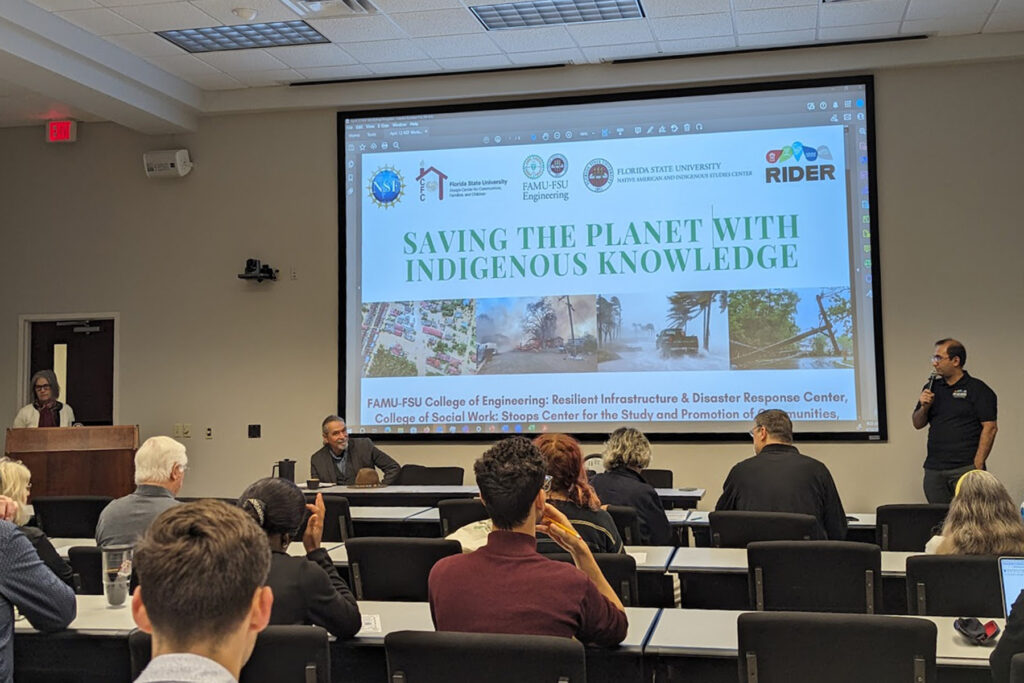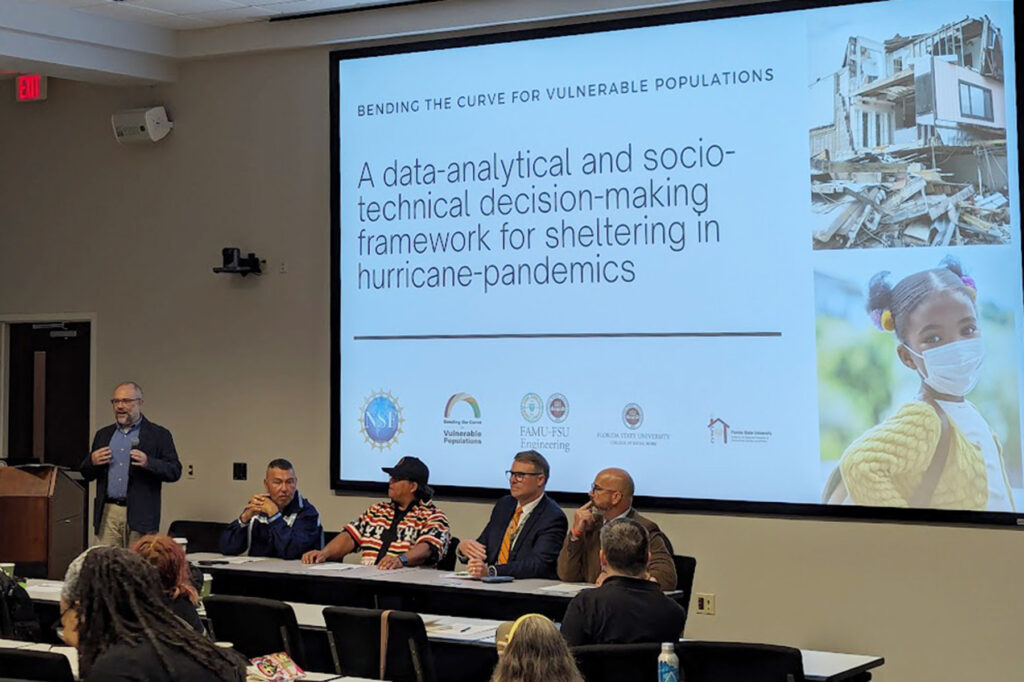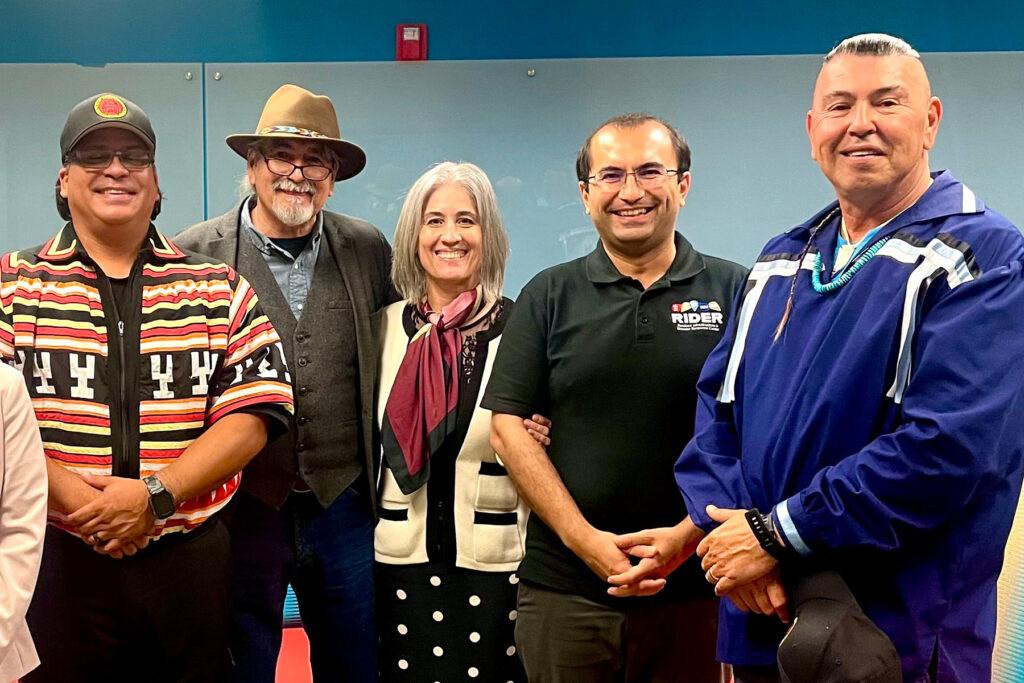By Anna Prentiss, Florida State University News
Florida State University recently hosted “Saving the Planet with Indigenous Knowledge,” a free workshop exploring the concept of adaptive resilience for the Florida Gulf’s coastal communities, with a focus on the inclusion of Indigenous knowledge.
The event was part of a National Science Foundation Research Coordination Network (RCN) award project focused on resilient rural infrastructure. Its goal was to foster a new understanding of the complex interactions among key elements of community resilience in rural coastlines and inland areas to adapt to an ever-changing climate and potential natural disasters.

“This RCN project is about creating connections all over the United States, in addition to Florida, to develop disaster resilience actions, tools, strategies, plans and policies — with a focus specifically on our rural areas,” said Eren Erman Ozguven, associate professor of civil and environmental engineering in the FAMU-FSU College of Engineering, director of the Resilient Infrastructure and Disaster Response (RIDER) Center and principal investigator on this project. “When you talk about rural areas, there are many different vulnerable populations that we need to consider.”
In 2022, Ozguven held a workshop with a focus on Hurricane Michael’s impact on rural areas in the Panhandle. Gathering leading community members, government, industry and researchers, this workshop provided insight on how to bridge the “resilience divides” these rural communities have been facing.
“We are now getting into the discussion with the Seminole Tribe of Florida and how Indigenous communities cope with disasters, learning from them, and we also hope to help them as well,” he said. “They have a way of enduring these events — so it is a way to gather their knowledge into disaster planning.”
“Saving the Planet with Indigenous Knowledge” brought together experts from across FSU, including the FAMU-FSU College of Engineering and its RIDER Center, the College of Social Work, the Stoops Center for Communities, Families, and Children and the Native American and Indigenous Studies Center.
“This was an interesting opportunity to meet with other professionals from emergency management,” said Paul Downing, director of the Office of Emergency Management for the Seminole Tribe of Florida and tribal citizen. “Listening to the diverse perspectives in academia and emergency management gives us a different perspective and allows us to showcase that we are not ignorant to what’s going on, and how we are developing our own procedures to respond to disasters.”

Members of the public, researchers and professionals from across diverse professions were given a unique opportunity to network and form work groups to address the need for interdisciplinary, community-based collaboration to build the resilience and infrastructure of rural communities in the Florida Panhandle.
“Through this event, we learned how we can help collect data, not only from the emergency management side, but also from the health side, and how emergency management can forward that data to help with this study,” said Sonny Frank, emergency management coordinator for the Seminole Tribe of Florida.
For Andrew Frank, director of the FSU Native American and Indigenous Studies Center, the most exciting aspect of the workshop was seeing the collective problem-solving from individuals across multiple colleges and disciplines.
“The success of the center is because of our great colleagues across campus that allow us to lead or contribute to ongoing projects,” Frank said. “The more we realize that the folks in engineering and the folks in the humanities speak the same language and have a lot in common, the better we recognize our tremendous future.”
Keynote speaker Daniel Wildcat, an accomplished author, speaker and scholar at the Haskell Indian Nations University and director of the American Indian studies program at Haskell Environmental Research Studies Center, shared Indigenous knowledge related to the interconnectedness between the environment, communities and policy.
“Dr. Wildcat explained how Indigenous worldview and most modern science might seem completely different, but they’re tied by a commitment to accomplish ambitious solutions,” Frank said.
Attendees were gifted a copy of Wildcat’s book, “Red Alert! Saving the Planet Through Indigenous Knowledge.”

“It was a great discussion of some of the Indigenous-informed challenges of emergency management,” said Dean Michel, a doctoral candidate in the FSU Department of History and enrolled member of the Chemehuevi Indian Tribe. “I hope that it will be useful as people think about engaging with emergency preparedness and address the issues many tribal people face when working with government officials.”
The College of Social Work and Stoops Center for Communities, Families and Children have been a conduit for interdisciplinary research and projects across Florida State’s campus and across local and regional communities to promote collaboration targeting recovery and resilience, including several years of work with the College of Engineering and RIDER Center.
“Our college and center make it our mission to support the most vulnerable populations who need it most during times of crisis like natural disasters,” said Ellen Piekalkiewicz, director of the Stoops Center. “We hope to continue connecting with our Indigenous and local communities to share our knowledge and be mutual means of support.”
This piece was originally published at https://news.fsu.edu/news/university-news/2024/04/18/fsu-indigenous-knowledge-workshop-discusses-challenges-in-building-resilient-coastal-communities/.
Sign up for The Invading Sea newsletter by visiting here. If you are interested in submitting an opinion piece to The Invading Sea, email Editor Nathan Crabbe at nc*****@*au.edu.



